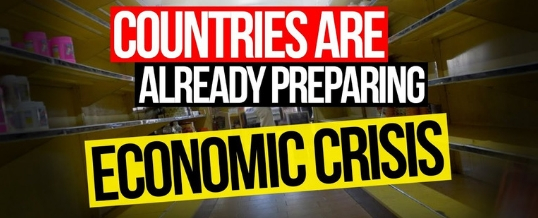
Leading economists, analysts, and financial companies are in agreement that financial crisis is looming. More specifically, experts agree that 2020 is going to be the year of economic collapse. Experts also agree that many things going on right now are leading to the turmoil that will be felt next year. For example, experts believe that large deficits in the U.S, China’s lax policies in finance and lending, and recovering European markets could all lend to a level of instability in the economy. This could create a perfect storm for a global recession, and this is exactly what leading experts agree is going to happen.
In the United States, inflation is forecast to rise beyond target limits, and this will ultimately lead to an increase in interest rates. This in itself could have far-reaching impacts on investors around the world. Ultimately, experts see this is a trigger for slowed economic growth around the world.
As it stands, this stark warning has been acknowledged by some of the most respected names in finance. Ben Bernanke and Alan Greenspan, both former U.S. Federal Reserve heads, have issued such warnings. Scott Minerd, CIO at Guggenheim Partners issued the same kind of warning, and JPMorgan made a prediction of a 20% U.S. stock slump and a loss of liquidity in financial markets.
As you can imagine, this is causing a stir for people around the world who want to invest and put their money in the best place possible. In the face of one of the biggest economic crises in modern history, what is the best way to brace oneself for the inevitable collapse?
Consider Relocation
It’s easy to say that moving to another area is a solution, especially when you consider the investment of money and time involved in such a move. If you find moving to another country feasible, however, it is an option. Thanks to the changing world of commerce, moving your household items to another country isn’t as difficult or as costly as it once was. This could be a reality for you, considering your specific situation.
On the other hand, you might consider getting a second passport. If you can hold dual citizenship in a different country, it doesn’t hurt to ensure your interests.
Invest in Digital Assets
Moving to another country isn’t always an option, but making smarter investments is always a good idea. You can easily invest in digital assets such as cryptocurrency in the face of an economic crisis. For example, many people during the most recent financial crisis in Greece invested in cryptocurrency such as Bitcoin.
When you invest in this kind of currency, it’s important to know that you are investing in an unregulated, decentralized economy - which means nobody can access it except you (or someone who holds your access secrets). Essentially, it’s a safe and anonymous place to put your money when the economy gets rough, although many have made long-term gains from using cryptocurrency.
Buy Gold and Silver
Precious metals, including gold and silver, tend to hold their values very well, and so if you were to invest in them now, then you would be able to reap the monetary benefits later. In other words, you could buy metals now and sell them after the economic crisis passes to recoup money as opposed to losing it in a failing economy. Other minerals beyond gold and silver are worthwhile, including water.
Consider Offshore Options
Investor confidence in cryptocurrency is still on the fence, with many people unsure whether they really want to trust such a platform. While it offers many benefits, the appeal of keeping your hard-earned investments safe in the centralized economy can’t be beat. That leads many people to turn to offshore investing to hedge against economic turmoil.
If you can find an offshore jurisdiction that’s safe and secure, why not entrust it with your investments? Opening offshore bank accounts is easier than ever. Perhaps not publicly mentioned, but you don’t have to travel to open offshore bank accounts. Indeed, many jurisdictions offer banks where you can open your account online.
Offshore banking is enticing because it can be used as a way to avoid higher taxes. If you bank in an area with lower taxes, you reap obvious benefits. What's more, banks in offshore financial centers tend to be more fundamentally sound, especially compared to banks in the Western world - which means that your assets are generally safer offshore than onshore.
If you're worried about the legal implications of protecting your assets offshore, then consider this: Offshore banks, companies and investment instruments are only as legal as what you use them for. As long as you don’t try to hide your deposits and investments from your home country's government and tax men, then there’s nothing illegal about offshore banking.
Build International Finances
The bottom line is that when you build international finances, you can diversify and protect more of your assets. If you can build credit on an international basis, for example, then you can secure loans, mortgages, and other instruments. You’ll experience a further ease in moving assets across international borders, if the need should arise.
JAN
2019

Table of Contents